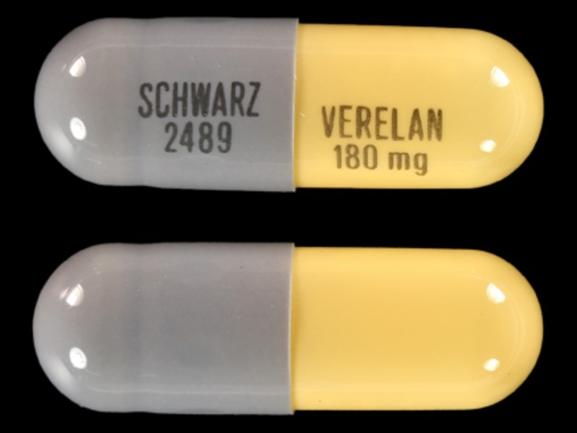Verelan Interactions
There are 671 drugs known to interact with Verelan (verapamil), along with 12 disease interactions, and 3 alcohol/food interactions. Of the total drug interactions, 131 are major, 487 are moderate, and 53 are minor.
- View all 671 medications that may interact with Verelan
- View Verelan alcohol/food interactions (3)
- View Verelan disease interactions (12)
Most frequently checked interactions
View interaction reports for Verelan (verapamil) and the medicines listed below.
- Aricept (donepezil)
- aspirin
- Ativan (lorazepam)
- Cardizem (diltiazem)
- Celebrex (celecoxib)
- Coumadin (warfarin)
- Cozaar (losartan)
- Crestor (rosuvastatin)
- Cymbalta (duloxetine)
- Effexor XR (venlafaxine)
- Flagyl (metronidazole)
- Inderal (propranolol)
- Lamictal (lamotrigine)
- Lasix (furosemide)
- Lexapro (escitalopram)
- Lipitor (atorvastatin)
- lisinopril
- Lyrica (pregabalin)
- metformin
- Nexium (esomeprazole)
- Norvasc (amlodipine)
- Phenergan (promethazine)
- Prilosec (omeprazole)
- Procardia (nifedipine)
- Protonix (pantoprazole)
- Singulair (montelukast)
- Topamax (topiramate)
- Xanax (alprazolam)
- Zofran (ondansetron)
- Zyrtec (cetirizine)
Verelan alcohol/food interactions
There are 3 alcohol/food interactions with Verelan (verapamil).
Verelan disease interactions
There are 12 disease interactions with Verelan (verapamil) which include:
- aortic stenosis
- bradyarrhythmia/AV block
- cardiogenic shock/hypotension
- coronary artery disease
- liver disease
- ventricular tachycardia
- accessory AV tracts
- CHF/AMI
- hypertrophic cardiomyopathy
- neuromuscular transmission
- renal dysfunction
- GI narrowing
More about Verelan (verapamil)
- Verelan consumer information
- Compare alternatives
- Reviews (2)
- Drug images
- Side effects
- Dosage information
- During pregnancy
- Generic availability
- Drug class: calcium channel blockers
- Breastfeeding
- En español
Related treatment guides
Drug Interaction Classification
| Highly clinically significant. Avoid combinations; the risk of the interaction outweighs the benefit. | |
| Moderately clinically significant. Usually avoid combinations; use it only under special circumstances. | |
| Minimally clinically significant. Minimize risk; assess risk and consider an alternative drug, take steps to circumvent the interaction risk and/or institute a monitoring plan. | |
| No interaction information available. |
See also:
Further information
Always consult your healthcare provider to ensure the information displayed on this page applies to your personal circumstances.


